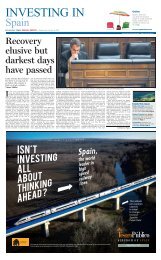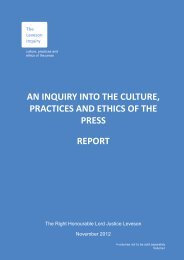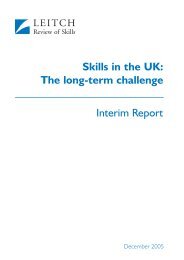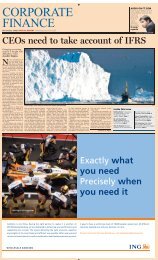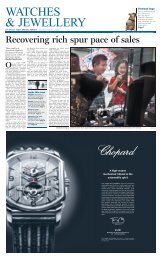Trading Insight - Financial Times - FT.com
Trading Insight - Financial Times - FT.com
Trading Insight - Financial Times - FT.com
You also want an ePaper? Increase the reach of your titles
YUMPU automatically turns print PDFs into web optimized ePapers that Google loves.
<strong>FT</strong> SPECIAL REPORT<br />
<strong>Trading</strong> <strong>Insight</strong><br />
Friday December 7 2012 www.ft.<strong>com</strong>/reports | twitter.<strong>com</strong>/ftreports<br />
Wall Street’s post-election jitters<br />
Fears over the economy and the fiscal cliff may drive US investors to seek havens Page 4<br />
Inside »<br />
Overview<br />
Markets assured<br />
by global political<br />
continuity<br />
Page 2<br />
UK recovery<br />
Retail is among<br />
the sectors that<br />
have upside<br />
potential<br />
Page 3<br />
China<br />
Change of<br />
leadership<br />
may kick-start<br />
the economy<br />
Page 6<br />
Play the game<br />
Experts say<br />
research and<br />
discipline is vital<br />
for rookies<br />
Page 7<br />
On <strong>FT</strong>.<strong>com</strong> »<br />
Moving markets<br />
Why you should<br />
learn to love<br />
volatility
2 FINANCIAL TIMES FRIDAY DECEMBER 7 2012 FINANCIAL TIMES FRIDAY DECEMBER 7 2012 3<br />
For most Republicans, Mitt Romney’s<br />
defeat by Barack Obama in November’s<br />
US presidential elections was a crushing<br />
blow. But perhaps not for Ben Bernanke,<br />
the chairman of the Federal Reserve and a<br />
registered Republican voter.<br />
Mr Bernanke’s current term as Fed chairman<br />
ends in 2014 and Mr Romney had said he would<br />
seek a different chairman. Many in the Republican<br />
party were uneasy about the Fed’s exceptionally<br />
easy monetary policy. With Mr Obama installed in<br />
the White House for another four years, Mr Bernanke’s<br />
reappointment – and a continuation of current<br />
policies – seem more likely than not.<br />
Such continuity is reassuring for markets. Whatever<br />
else economists and strategists may argue<br />
about when they consider the outlook for 2013,<br />
they are mostly agreed on one thing: easy monetary<br />
policy is here for a while yet.<br />
“Going into 2013, we think monetary policy will<br />
remain supportive and past initiatives are unlikely<br />
to be reversed,” says Willem Sels, UK head of<br />
investment strategy at HSBC Private Bank. “Interest<br />
rates in the west should stay unchanged, and<br />
the liquidity injected by central banks should<br />
remain in the system for the foreseeable future.”<br />
This will have the same effect as in previous<br />
years. Cash and benchmark government bonds are<br />
likely to remain low-yielding and unattractive.<br />
Though many think government bonds are overvalued,<br />
there are few signs of the bubble deflating.<br />
The old maxim of “don’t fight the Fed” seems apt,<br />
especially given that the Bank of England, the<br />
European Central Bank and the Bank of Japan are<br />
also engaged in unconventional monetary policies.<br />
Investors looking for real returns will be forced<br />
into higher-yielding sovereign and corporate debt,<br />
emerging currencies and equities. More of the<br />
same from the central bankers means market<br />
attention will be on politicians, especially in the<br />
US, where Capitol Hill mathematics make finding<br />
a solution to the “fiscal cliff” a daunting task.<br />
The newly installed leadership in the world’s<br />
second-biggest economy faces different challenges.<br />
China’s rampant growth slowed in 2012, and many<br />
investors are expecting some sort of stimulus<br />
package in 2013 to reinvigorate the economy.<br />
That could have an effect on <strong>com</strong>modities, given<br />
that China is the key consumer of industrial metals<br />
in particular, and on the outlook for currencies<br />
and shares in the important supplier countries,<br />
such as Australia, Canada, Chile and Brazil. The<br />
Canadian and Australian dollars reached US dollar<br />
parity in the past few years; a weaker outlook for<br />
<strong>com</strong>modities might push them back.<br />
Opinions vary on the outlook for Chinese equities.<br />
“Chinese stocks remain very cheap . . . and we<br />
are hopeful policy measures will be<strong>com</strong>e more<br />
supportive for economic growth following the<br />
recent leadership transition,” says Mr Sels.<br />
Others are more circumspect. Robin Parbrook,<br />
head of Asia ex-Japan equities at Schroders, the<br />
investment manager, says: “What is driving the<br />
recent pick-up in growth forecasts for China is an<br />
acceleration of fixed asset investment. In short,<br />
this is exactly what we don’t want to see – more<br />
excess capacity and more questionable infrastructure<br />
build-out equals falling returns on capital for<br />
shareholders.<br />
“We remain cautious on China’s stock markets<br />
and nothing on the political front indicates any<br />
<strong>com</strong>mitment to real change.”<br />
Europe is another area on which opinion is<br />
divided, largely on whether sufficient economic<br />
and political risk has been factored into earnings<br />
estimates and share prices. Jason Hollands, head<br />
of business development at Bestinvest, the advisory<br />
firm, feels it has. “European equities are<br />
simply very undervalued both <strong>com</strong>pared to bonds<br />
and to US equities,” he says.<br />
Others disagree. Aberdeen Asset Management,<br />
in its latest World Markets View, says: “Europe<br />
still faces the prospect of a prolonged period of<br />
<strong>Trading</strong> <strong>Insight</strong> <strong>Trading</strong> <strong>Insight</strong><br />
Continuity reassures markets<br />
Overview The lack of political change and ongoing monetary easing are <strong>com</strong>forting, writes Jonathan Eley<br />
austerity and recession. Given weakened economies<br />
and lowered earnings expectations, valuations<br />
now appear less appealing after a four-month<br />
rally in share prices.”<br />
Politically, some still predict an eventual Greek<br />
exit from the eurozone, but most <strong>com</strong>mentators<br />
think “muddling through” is the likely scenario.<br />
A key factor in 2013 will be the German federal<br />
election. Chancellor Angela Merkel seems likely to<br />
retain power. The question is what government<br />
she will lead – another coalition with the Free<br />
Democrats or a grand coalition with the main<br />
opposition – and whether a growing eurosceptic<br />
movement can force her into a more strident tone<br />
towards eurozone bailouts.<br />
Another big theme for 2013 could be France,<br />
whose credit rating was downgraded by Standard &<br />
Poor’s at the start of 2012 and by Moody’s towards<br />
the end. Given the heavy exposure of its banks to<br />
Europe’s weaker economies, its hefty <strong>com</strong>mitments<br />
to euro-area rescue schemes and subdued domestic<br />
growth, some wonder if French bond yields can<br />
remain at their current levels for long. “They look<br />
fiercely expensive and a number of headwinds<br />
could push prices lower,” says Barclays Wealth.<br />
One area that could surprise on the upside is<br />
southeast Asia, says Schroders. “Previously<br />
seen as a region wrought with fiscal indiscipline<br />
and political turmoil, countries there have<br />
managed to establish political stability. They’ve<br />
improved the investment environment and further<br />
strengthened their economic fundamentals, with<br />
Thailand, the Philippines and Indonesia in<br />
Election looms:<br />
Angela Merkel,<br />
Germany’s chancellor,<br />
hopes to retain<br />
power in 2013 AP<br />
Investors looking for real returns<br />
will be forced into higher-yielding<br />
sovereign and corporate debt,<br />
emerging currencies and equities<br />
particular performing well,” says Mr Parbrook.<br />
Nobody seems to be expecting much of India.<br />
There is widespread frustration among investors<br />
that the country’s noisy democracy has made<br />
implementation of liberalising reforms difficult.<br />
Overall, the picture is one of continued monetary<br />
easing and supportive central bankers, gradual<br />
political progress towards fiscal and budgetary<br />
reform and a subdued economic recovery, with<br />
growth remaining below trend in many areas.<br />
The potential for nasty surprises is ever-present,<br />
from bickering in Congress over tax cuts to Middle<br />
East stand-offs over Iran’s nuclear programme.<br />
How will investors respond? Already, there are<br />
signs that the long love-in with bonds is ending.<br />
Caution remains the watchword, but figures from<br />
the UK’s Investment Management Association<br />
show equity funds outsold bond funds in October<br />
for the first time this year, and pan-European<br />
research by Morningstar has shown that exposure<br />
to equities is increasing on the continent too.<br />
Many share offerings were called off during 2012,<br />
but high-profile floats such as Facebook in the US<br />
showed that if the pricing is right, <strong>com</strong>panies can<br />
still be sold. The “grey markets” that develop ahead<br />
of the official start of trading are being opened up<br />
to retail customers by spread betting firms.<br />
Investor appetite for carefully priced initial public<br />
offerings is a reminder that corporate prospects<br />
are not necessarily the same as economic ones, a<br />
point not lost on strategists at Aberdeen Asset<br />
Management. “Despite the poor health of many<br />
developed market economies, many <strong>com</strong>panies are<br />
in very good shape. Healthy balance sheets and<br />
diverse revenue streams mean they are well positioned<br />
to weather the tough economic conditions<br />
in their domestic markets,” the group says.<br />
This is especially true in the US. Joanna<br />
Shatney, head of US large-cap equities at<br />
Schroders, the fund manager, says: “We feel <strong>com</strong>pany<br />
balance sheets will continue to be repaired as<br />
the benefits of a pick-up in consumer spending, an<br />
improving employment picture and a housing<br />
recovery in 2013 <strong>com</strong>e through.”<br />
Recovery hopes<br />
give boost to<br />
cyclical shares<br />
UK economy<br />
Retail is among the<br />
sectors with upside<br />
potential, reports<br />
Tanya Powley<br />
Any flickering hopes of a<br />
rapid UK economic recovery<br />
were dashed last month as<br />
economic data pointed to a<br />
gloomy outlook.<br />
Poor retail sales figures<br />
and rising inflation have<br />
added to concerns the economy<br />
has lost momentum<br />
since it left recession in the<br />
third quarter. Retail sales<br />
fell 0.8 per cent between September<br />
and October in volume<br />
terms, to their lowest<br />
since May, while consumer<br />
price inflation rose from 2.2<br />
per cent in September to 2.7<br />
per cent in October.<br />
“The rise in third-quarter<br />
gross domestic product is<br />
likely to be a one-off if<br />
recent economic data for<br />
the fourth quarter are anything<br />
to go by as inflation<br />
remains high,” says Michael<br />
Hewson, senior market analyst<br />
at CMC Markets.<br />
Although signs of a full<br />
recovery are far off, analysts<br />
say traders should<br />
keep an eye on ways to benefit<br />
from better economic<br />
news. Ashraf Laidi, chief<br />
global strategist at City<br />
Index, says that because of<br />
the risk of a renewed economic<br />
contraction, investors<br />
could consider trading<br />
a <strong>com</strong>bination of early<br />
cyclical <strong>com</strong>panies, those<br />
benefiting from the early<br />
stages of economic recoveries,<br />
and defensive shares.<br />
Cyclical shares mirror<br />
trends in the general economy<br />
and include the construction,<br />
property, retail<br />
and technology industries.<br />
“Such a strategy enables<br />
traders to capture potential<br />
price upside from improved<br />
economic data while hedging<br />
against disappointment,”<br />
says Mr Laidi.<br />
Traditionally, trading the<br />
<strong>FT</strong>SE 100 would have been<br />
a good way to gain exposure<br />
to a UK recovery, but<br />
experts caution against<br />
this, saying the index is no<br />
longer a true reflection of<br />
the UK economy.<br />
“In recent years the <strong>FT</strong>SE<br />
100 has morphed from an<br />
index predominantly populated<br />
by UK <strong>com</strong>panies to<br />
an index dominated by global<br />
<strong>com</strong>modities and financial<br />
services <strong>com</strong>panies,<br />
whose earnings are overwhelmingly<br />
international,”<br />
says Angus Campbell, head<br />
of market analysis and<br />
<strong>com</strong>munications at London<br />
Capital Group.<br />
To allow clients to trade<br />
the UK economy directly,<br />
the group created the Capital<br />
Spreads UK 30 Index, a<br />
tradeable stock index<br />
<strong>com</strong>prising 30 top UK-based<br />
<strong>com</strong>panies whose earnings<br />
are 75 per cent or more<br />
derived from the UK.<br />
Retail stocks are a popular<br />
trade for those looking<br />
to bet on a recovery. “The<br />
retail sector, apart from<br />
some high-profile bad news<br />
stories, has proved to<br />
be quite resilient this<br />
year, outperforming the<br />
broader <strong>FT</strong>SE 100 by some<br />
margin,” notes CMC’s Mr<br />
Hewson.<br />
Outperformers, he says,<br />
include Debenhams, the<br />
department store, whose<br />
share price has risen 80 per<br />
cent in the past year, and<br />
Dixons, the electrical<br />
retailer, which has benefited<br />
from troubles at rival<br />
Comet.<br />
Others have not fared as<br />
well. Last month, Marks<br />
and Spencer reported a 10<br />
per cent fall in pre-tax<br />
Experts caution<br />
against trading the<br />
<strong>FT</strong>SE 100, as it no<br />
longer truly reflects<br />
the UK economy<br />
profit to £289.5m in the six<br />
months to September 29.<br />
Argos, owned by Home<br />
Retail Group, has also<br />
underperformed.<br />
“If we see some form of<br />
recovery, some of the<br />
underperforming <strong>com</strong>panies<br />
could enjoy a bit of uplift as<br />
the more richly valued<br />
shares are likely to find<br />
there is less upside potential,”<br />
says Mr Hewson.<br />
A pairs trade or spread<br />
trade is one way to play the<br />
retail market. Mr Hewson<br />
says buying an undervalued<br />
stock and selling the more<br />
expensive stock in anticipation<br />
of a narrowing differential<br />
in price can be a<br />
fairly low-risk strategy.<br />
Investors could also<br />
spread bet on various <strong>FT</strong>SE<br />
350 sector indices. “If you<br />
have a broad view on a particular<br />
industry’s fortunes<br />
but are not so stock specific,<br />
you can still position<br />
yourself to profit from a<br />
wider recovery,” says<br />
Brenda Kelly, technical<br />
analyst at IG, the spread<br />
betting providers.<br />
On <strong>FT</strong>.<strong>com</strong> »<br />
On the move<br />
Mobile spread bets<br />
account for a<br />
fifth of revenue<br />
Contributors »<br />
Jonathan Eley<br />
Personal Finance Editor<br />
Tanya Powley<br />
Personal Finance Reporter<br />
Lucy Warwick-Ching<br />
Online Money Editor<br />
Elaine Moore<br />
Deputy Personal Finance Editor<br />
Huw Richards<br />
<strong>FT</strong> Contributor<br />
Adam Jezard<br />
Commissioning Editor<br />
Steven Bird<br />
Design<br />
Andy Mears<br />
Picture Editor<br />
For advertising details,<br />
contact: Rachel Padhiar, +44<br />
(0) 20 7873 3564, email<br />
rachel.padhiar@ft.<strong>com</strong>, or<br />
your usual <strong>FT</strong> representative.<br />
All <strong>FT</strong> Reports are available<br />
on <strong>FT</strong>.<strong>com</strong> at ft.<strong>com</strong>/reports<br />
Follow us on Twitter at<br />
twitter.<strong>com</strong>/ft.report
4 FINANCIAL TIMES FRIDAY DECEMBER 7 2012 FINANCIAL TIMES FRIDAY DECEMBER 7 2012 5<br />
Fiscal cliff remains focus of<br />
investors after Obama win<br />
Post-election Parties need to work together on a solution, says Elaine Moore<br />
Barack Obama’s re-election as<br />
president of the US was met with<br />
cheers and confetti in his home<br />
town of Chicago, but the enthusiasm<br />
of his political supporters<br />
has not been matched in Wall Street.<br />
The morning after the presidential race<br />
was over, the S&P 500 – an index of the<br />
largest <strong>com</strong>panies in the US – fell sharply.<br />
Bank, oil and defence stocks dropped, as<br />
those who had bought in the hope of a Mitt<br />
Romney win sold their holdings, and shares<br />
of gun <strong>com</strong>panies, such as Smith & Wesson,<br />
rose due to speculation that gun lovers<br />
would stock up ahead of possible ownership<br />
restrictions.<br />
But the focus of investors remains the<br />
so-called “fiscal cliff”. Regardless of who<br />
won the US election, the $600bn package of<br />
tax increases and spending cuts was always<br />
due to <strong>com</strong>e in at the end of the year.<br />
Many US investors worry the automatic<br />
cuts and tax increases could tip the US<br />
economy back into recession. If no deal<br />
appears in the next few weeks, markets are<br />
expected to be choppy over the short term.<br />
“Obama’s victory is a historical and political<br />
landmark, but financial markets have<br />
plenty to worry about,” noted Angus Campbell,<br />
head of market analysis at London<br />
Capital Group. The clash of ideals between<br />
Republicans and Democrats left last year’s<br />
plan to raise the US debt ceiling in gridlock,<br />
sending markets into a “volatile tailspin”.<br />
“There will be plenty to discuss in<br />
the weeks leading up to the new year,”<br />
says Mr Campbell, referring to both the<br />
political and financial worlds.<br />
In spite of the immediate drop in the US<br />
stock market, there are some positive<br />
aspects to Mr Obama’s re-election, thinks<br />
Michael Hewson, senior market analyst at<br />
CMC Markets. “From a continuity point of<br />
view, Obama’s win is a positive for<br />
investors, as it gives certainty with respect<br />
to US monetary policy and the governance<br />
of the Federal Reserve over the next four<br />
years,” he says.<br />
But the fiscal cliff still looms, counters<br />
Christopher Beauchamp at IG Markets.<br />
<strong>Trading</strong> <strong>Insight</strong> US View <strong>Trading</strong> <strong>Insight</strong> US view<br />
“The sharp drop in markets following his<br />
re-election should give Mr Obama a useful<br />
reminder of how important this event is,”<br />
says Mr Beauchamp. “The <strong>com</strong>bination of<br />
spending cuts and tax increases could<br />
result in a sharp contraction in US GDP, so<br />
markets are understandably nervous.”<br />
What investors want, he believes, is a<br />
clear <strong>com</strong>mitment from the White House to<br />
work with both political parties to craft a<br />
solution. The problem is that this would<br />
require both sides to give up some of their<br />
sacred cows (defence for Republicans,<br />
social security for Democrats).<br />
If they cannot work out their differences,<br />
and the fiscal cliff be<strong>com</strong>es a reality, then<br />
over the short term investors may seek out<br />
havens – a strategy that has been regularly<br />
employed over the past few years.<br />
If investors do choose to flee to havens, it<br />
might result in a bout of stock market<br />
weakness, with un<strong>com</strong>fortable echoes of<br />
August 2011, when the debt ceiling crisis<br />
increased market volatility.<br />
“We have seen with the eurozone crisis<br />
A New York Stock Exchange trader anxiously awaits the election result Bloomberg<br />
how unguarded <strong>com</strong>ments from political<br />
leaders can cause rapid gyrations, and the<br />
same could take effect with regards to the<br />
fiscal cliff,” says Mr Beauchamp. He picks<br />
out the yen, the Japanese currency, as an<br />
investment haven that could see a new<br />
lease of life, in spite of efforts by the Bank<br />
of Japan to hold the currency down. But<br />
not all traditional havens will be favoured.<br />
“Usually the US dollar and Treasuries<br />
would be another destination, but these<br />
would be less attractive while the arguments<br />
fly,” he says. Instead, German Bunds<br />
could be the preferred choice.<br />
Market volatility in the weeks leading up<br />
to the budget decision has the potential to<br />
create plenty of trading opportunities, suggests<br />
Mr Campbell. Investors would be wise<br />
to consider the dollar, gold, the Dow and<br />
even the <strong>FT</strong>SE as the impact of the cuts<br />
and tax increases will be felt beyond the<br />
shores of the US.<br />
“The belief is this [volatility] will support<br />
gold, and could potentially see it test new<br />
all-time highs above the $1,920 mark,” he<br />
suggests. “Gold is traditionally seen as a<br />
haven, but if more stimulus is forth<strong>com</strong>ing<br />
to help prop up the US economy, this could<br />
also support other risk assets such as the<br />
Dow, and weaken the dollar.”<br />
Regardless of the ultimate decision made<br />
over cuts, it seems likely that US growth<br />
could well show some signs of slowing next<br />
year, says Mr Hewson.<br />
However, he adds, barring a calamity, the<br />
US should still outperform Europe, which<br />
is likely still to be dealing with all its<br />
sovereign debt problems and a Spanish<br />
bailout request. “This means that the US<br />
dollar is likely to outperform, particularly<br />
against the euro and the pound,” he says,<br />
presenting numerous opportunities for<br />
investors interested in currency trades.<br />
Bigger betters backed the loser<br />
Democrat victory<br />
Wealthier clients<br />
tended to support<br />
Mitt Romney, writes<br />
Huw Richards<br />
When Barack Obama was<br />
declared the winner of<br />
Florida’s 29 electoral votes<br />
some days after the other<br />
results in last month’s US<br />
presidential election were<br />
announced, it seemed to<br />
most an academic matter.<br />
But for one customer of<br />
Spreadex, a spread betting<br />
firm, it was anything but.<br />
The day before the poll on<br />
November 6 he had sold<br />
Mr Obama’s electoral votes<br />
total at 290. He would still<br />
have been a loser had<br />
Republican challenger Mitt<br />
Romney taken Florida,<br />
since it would have left Mr<br />
Obama with 303, equalling<br />
John F. Kennedy’s winning<br />
tally in 1960.<br />
However, Mr Obama’s<br />
win in Florida transformed<br />
the scale of the Spreadex<br />
customer’s losses. “He<br />
would have lost around<br />
£60,000, but instead lost<br />
more than £200,000,”<br />
explains Andy MacKenzie,<br />
Spreadex marketing<br />
<strong>com</strong>munications manager.<br />
Quite a few punters were<br />
left totting up their losses<br />
after Mr Obama won by a<br />
wider margin than was<br />
generally predicted in the<br />
last month of the<br />
campaign.<br />
“Money was generally<br />
going on whoever had the<br />
momentum. So after the<br />
first debate people were<br />
getting with Romney, then<br />
when super storm Sandy<br />
hit, clients were getting<br />
with Obama due to his<br />
handling of the disaster,”<br />
Mr MacKenzie says.<br />
There was a difference in<br />
betting patterns on the two<br />
candidates. “The generally<br />
bigger-staking clients<br />
seemed keener to get with<br />
Romney and the smallerstaking<br />
ones with Obama,”<br />
Mr MacKenzie says.<br />
Intrade, the Ireland-based<br />
predictions market, also<br />
saw big losses on the<br />
Republican. “We had a lot<br />
of money on Romney and<br />
some fairly heavy losses, a<br />
few of them over £200,000,”<br />
says Carl Wolfenden,<br />
Intrade politics trader.<br />
Such losses, and<br />
<strong>com</strong>parable wins, are part<br />
of the volatility that<br />
underpins spread markets.<br />
“Losses of this kind are<br />
not un<strong>com</strong>mon among our<br />
top tier of wealthy clients.<br />
We have a number who<br />
trade in large sizes across<br />
all parts of the market,”<br />
‘He would have lost<br />
around £60,000,<br />
but instead lost<br />
more than<br />
£200,000’<br />
Mr MacKenzie says.<br />
Business increased for<br />
both firms. “We had 4.3m<br />
trades on the presidency<br />
markets in 2008 and 12m<br />
this time,” says Mr<br />
Wolfenden, who attributes<br />
part of the increase to a<br />
change in Intrade’s charges<br />
from transaction fees to<br />
subscriptions.<br />
Intrade also upheld its<br />
reputation for displaying<br />
“the wisdom of crowds” as<br />
a means of predicting<br />
elections. As in 2008, 48 of<br />
the 50 states went the way<br />
its markets were pointing<br />
at the start of polling day.<br />
“We missed Florida and<br />
Virginia, which is hardly<br />
outrageous, and you have<br />
to remember that our<br />
markets are not making<br />
actual predictions but<br />
assigning a probability,”<br />
Mr Wolfenden says.<br />
Nor did Intrade ever<br />
show Mr Romney as being<br />
ahead of Mr Obama, with<br />
the president running at<br />
about 60 per cent for most<br />
of the year. “His lowest<br />
close was 55.1 per cent on<br />
October 23, but he had<br />
closed at 60.8 the day<br />
before and was back to 59.7<br />
on the 24th,” Mr<br />
Wolfenden says.<br />
If 2012 was good for the<br />
spread <strong>com</strong>panies, 2016<br />
promises to be even better.<br />
“Unless Joe Biden runs for<br />
the Democrats, which<br />
many consider unlikely, we<br />
will be back to 2008, with<br />
no incumbents on either<br />
side and a whole range of<br />
possibilities,” Mr<br />
Wolfenden says.
6 FINANCIAL TIMES FRIDAY DECEMBER 7 2012 FINANCIAL TIMES FRIDAY DECEMBER 7 2012 7<br />
Change of<br />
leadership<br />
may give spur<br />
to growth<br />
China There are various opportunities for investors to<br />
gain a foothold in the world’s second-largest economy,<br />
if they can think laterally, says Tanya Powley<br />
Those investors who remain hopeful<br />
the slowdown in China has<br />
bottomed out have an increasing<br />
number of routes for gaining exposure<br />
to the world’s second-largest<br />
economy.<br />
Chinese industrial production, investment<br />
and retail sales all accelerated in<br />
October, confirming China has ended its<br />
nearly two-year slowdown. But while China<br />
is still on track for growth of under 8 per<br />
cent this year, this is likely to be its weakest<br />
growth in more than a decade.<br />
The official anointment of Xi Jinping last<br />
month, who will formally succeed Hu Jintao<br />
as president of the Chinese Communist<br />
party in March, has the potential to<br />
accelerate slowing growth. Experts say the<br />
refreshed politburo appears more purposeful<br />
than its predecessor and reforms, such<br />
as reordering the pension system and<br />
urbanisation of lower-tier cities, could<br />
boost the economy.<br />
“When looking to gain exposure to the<br />
swings of the Chinese economy, traders<br />
have traditionally needed to think laterally,”<br />
says Alastair McCaig, market analyst<br />
at IG. “It has been difficult to gain direct<br />
exposure to the Chinese renminbi, and<br />
trading equities on the Chinese exchange is<br />
difficult and expensive.”<br />
However, in October, G<strong>FT</strong> Markets<br />
started offering clients the ability to trade<br />
CNH – the Hong Kong listing of the renminbi<br />
– against the US dollar or Japanese<br />
Yen. This can be done as a contract for<br />
difference (CFD), a spread bet or a standard<br />
forex contract.<br />
“Although the currency is still tightly<br />
controlled by Beijing, the price is far from<br />
pegged, creating some interesting trading<br />
opportunities,” says Fawad Razaqzada,<br />
technical analyst at G<strong>FT</strong> Markets.<br />
Another option open to investors is to<br />
trade Chinese <strong>com</strong>panies quoted on the<br />
Hong Kong stock exchange, the Hang Seng.<br />
IG’s Mr McCaig suggests China Merchants<br />
Holdings and China Overseas Land<br />
& Investment could offer traders exposure<br />
to an expanding economy.<br />
China Merchants’ core business is operating<br />
container and cargo terminals, so it<br />
could benefit from increased economic<br />
activity, he says. Meanwhile, China Overseas<br />
Land & Investment develops and<br />
invests in properties, as well as running<br />
large infrastructure projects.<br />
This strategy has risks, analysts warn.<br />
“Investors in Chinese stocks will probably<br />
know better than most that there’s no sure<br />
bet when investing in equities,” says Angus<br />
Campbell, head of market analysis and<br />
<strong>com</strong>munications at London Capital Group.<br />
Chinese stocks have fallen by up to a<br />
third – or even half, according to which<br />
stock index you look at – since reaching<br />
dizzy heights in October 2007, says Mr<br />
Campbell. “When it looked like the good<br />
times were going to roll again back in 2009,<br />
following the mass sell off in 2008, US and<br />
European indices raced higher in the next<br />
couple of years. However, Chinese stocks<br />
lagged behind over fears their economy<br />
was going to suffer from a hard landing.”<br />
Mr McCaig says a less risky way of gaining<br />
exposure to the region could be to look<br />
at instruments that have a broader scope,<br />
such as exchange traded funds (ETFs).<br />
Traders can spread bet on the Hang Seng<br />
H-Share Index ETF, which tracks the Hang<br />
Seng China Enterprises Index. This should<br />
help to smooth out some of the volatility<br />
<strong>Trading</strong> <strong>Insight</strong><br />
‘Investors<br />
in Chinese<br />
stocks will<br />
know there’s<br />
no sure<br />
bet when<br />
buying<br />
equities’<br />
of trading just one share, says Mr McCaig.<br />
He adds: “The other advantage in using<br />
a product such as spread betting is eliminating<br />
the currency risk. Because it is<br />
all about pounds per point, assuming<br />
that sterling is your home currency, you<br />
are insulated from what may happen to<br />
the Hong Kong dollar or the Chinese<br />
renminbi.”<br />
The other option for spread betters is to<br />
trade mining stocks that are heavily influenced<br />
by the speed of growth out of China.<br />
Share prices of <strong>com</strong>panies such as<br />
Xstrata, Rio Tinto and BHP Billiton are<br />
often strongly correlated with Chinese<br />
metal demand, which means a strong and<br />
fast-growing Chinese economy can prove<br />
beneficial for these stocks, explains Ashraf<br />
Laidi, chief global strategist at City Index.<br />
If traders are confident the new<br />
leadership can turn things around in<br />
China, they can go long on mining shares.<br />
For example, if a trader were to buy<br />
Rio Tinto shares for £5 per point at a price<br />
of 3000p, and if Chinese growth improved<br />
and Rio Tinto’s share price rallied to 3200p,<br />
the trader would stand to make £1,000<br />
(200p x £5).<br />
Alternatively, if you are of the view that<br />
Chinese growth is set for a correction, you<br />
can decide to short sell mining shares.<br />
In a similar strategy, spread betters could<br />
trade the <strong>FT</strong>SE 350 mining sector.<br />
As Mr Laidi explains: “The key here is<br />
that, opposed to putting all of your eggs in<br />
one basket, you are taking a more diversified<br />
view on the successes or failures of an<br />
entire stock sector. Therefore, your risk is<br />
spread out over the performance of a<br />
number of mining stocks, as opposed to<br />
just one.”<br />
Ready for a soaking:<br />
Chinese stocks have<br />
fallen by up to half<br />
since October 2007<br />
Reuters<br />
The most <strong>com</strong>monly asked<br />
question at spread betting<br />
firm London Capital<br />
Group’s seminars is “how<br />
do I make money trading<br />
the markets?”, says Angus<br />
Campbell, the <strong>com</strong>pany’s<br />
head of market analysis and<br />
<strong>com</strong>munications.<br />
There is, he says, no easy<br />
way to make money from<br />
trading and this is something<br />
novice traders should<br />
realise right from the start.<br />
“New traders often have<br />
unrealistic aspirations and<br />
believe all they have to do<br />
is place a few £10 bets and<br />
they will spend the rest of<br />
their lives trading via a laptop<br />
from a beach in the<br />
sun,” he adds. “So the first<br />
thing to appreciate is that<br />
trading is tough and you’re<br />
not going to be<strong>com</strong>e an<br />
expert overnight.”<br />
When traders start they<br />
should begin in a market<br />
that suits them, says Mr<br />
Campbell.<br />
“All too often people will<br />
jump in at the deep end –<br />
trading a very volatile market<br />
to start off with, or a<br />
market they simply don’t<br />
understand,” he says.<br />
“Research and discipline<br />
are key to starting out and<br />
quickly you’ll know which<br />
market suits you.”<br />
Another <strong>com</strong>mon mistake<br />
made by traders is not<br />
being realistic. “Rookies<br />
often believe that one win<br />
means they have unlocked<br />
the secret to trading financial<br />
markets and go on to<br />
place a trade that uses up<br />
too much of their available<br />
deposit,” says Chris Beauchamp,<br />
market analyst at<br />
IG, the spread betting provider.<br />
Mr Beauchamp adds<br />
this leaves traders open to<br />
the possibility that a loss<br />
will remove a substantial<br />
chunk of their account.<br />
“More seasoned spread<br />
betters realise they can test<br />
the waters with a small<br />
trade, then add to this with<br />
new positions if the original<br />
goes in their favour.”<br />
The second most <strong>com</strong>mon<br />
mistake is a lack of risk<br />
management, says Lior<br />
Alkalay, senior analyst at<br />
eToro, the investment<br />
trader. “Novice traders get<br />
into a trade in the mistaken<br />
assumption things will turn<br />
in their favour,” he says.<br />
“They do not take the<br />
option that they might lose<br />
as probable. When the market<br />
turns against them they<br />
discover they were not<br />
exactly willing to lose, and<br />
then start to panic.”<br />
Others say successful<br />
trading starts with discipline.<br />
Shai Heffetz, managing<br />
director of InterTrader,<br />
says discipline can manifest<br />
itself in many ways, including<br />
decision making, such<br />
as the resolve not to move a<br />
stop-loss level and using<br />
only proven strategies.<br />
“At some point every<br />
trader will lose money, but<br />
the successful traders will<br />
learn a valuable lesson each<br />
time they make a loss and<br />
endeavour not to repeat the<br />
same mistake,” he adds.<br />
Mark Priest, head of<br />
index and equity market<br />
<strong>Trading</strong> <strong>Insight</strong><br />
Research and discipline are essential for rookies<br />
Play the game<br />
Planning when to<br />
cut your losses is<br />
key, writes Lucy<br />
Warwick-Ching<br />
Online dream: it takes time to be<strong>com</strong>e an expert Pindyurin Vasily<br />
making at ETX Capital,<br />
agrees. “Traders should<br />
enter into a trade with a<br />
clear level at which they<br />
intend to cut themselves<br />
out and stick to it,” he says.<br />
“Some tend to let their<br />
emotions cloud their view –<br />
exiting a trade is just as<br />
important as entering it. If<br />
you are in a position and<br />
it’s not moving as you<br />
expected it to, have an exit<br />
parameter and stick to it.”<br />
One suggestion is for<br />
rookies to trade fewer<br />
instruments, allowing them<br />
to watch trades closely, so<br />
giving them more of a feel<br />
for an index or sector.<br />
Another <strong>com</strong>mon mistake,<br />
says Matt Macklin,<br />
head of distribution at CMC<br />
Markets, is to over trade in<br />
an attempt to make up<br />
losses. This is quite normal,<br />
he adds, but unnecessary<br />
given that, as with any<br />
trading opportunity, there<br />
will always be another one<br />
as long as patience is<br />
exercised.<br />
Mr Beauchamp believes<br />
many new traders succumb<br />
to nerves and says the<br />
psychology of trading is as<br />
important as good research.<br />
He says experienced traders<br />
emphasise the importance<br />
of a trading plan, with the<br />
actual methodology of the<br />
plan being less important<br />
than the discipline needed<br />
to follow the rules.<br />
“Too often, new spread<br />
betters develop a plan but<br />
then deviate from it on a<br />
whim . . . causing unnecessary<br />
worry that might have<br />
been avoided had they<br />
stuck to the rules,” says Mr<br />
Beauchamp.<br />
There are plenty of clichés,<br />
but that does not<br />
make them less true. Mr<br />
Beauchamp believes a good<br />
one to remember is: “It’s a<br />
marathon, not a sprint. If<br />
trading is approached as<br />
some sort of get-rich-quick<br />
scheme, it usually results in<br />
both over trading and trading<br />
too big in proportion to<br />
the size of the account.”




